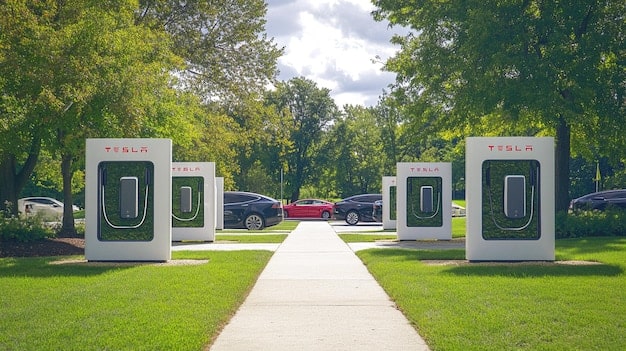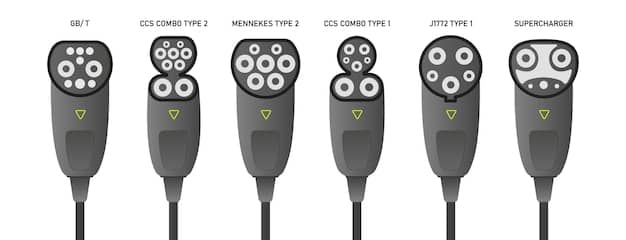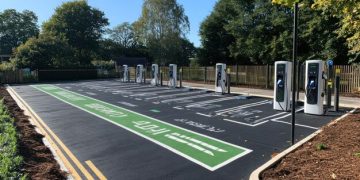FTC Investigates Anti-Competitive Practices in EV Charging Market

The Federal Trade Commission (FTC) is investigating allegations of anti-competitive practices within the electric vehicle (EV) charging market, focusing on potential monopolistic behaviors and unfair competition that could hinder the growth and accessibility of EV infrastructure.
The Federal Trade Commission (FTC) investigates allegations of anti-competitive practices in the electric vehicle charging market amid growing concerns over fair competition and market dominance. This scrutiny could reshape the landscape for EV charging providers and consumers alike.
FTC Scrutinizes EV Charging Market
The electric vehicle (EV) market is rapidly expanding, and with it, the demand for reliable and accessible charging infrastructure. However, concerns have arisen regarding potential anti-competitive practices among EV charging providers. The FTC’s involvement signals a serious look into these allegations.
Let’s delve into the specifics of the investigation and what it could mean for the future of EV charging and the broader EV ecosystem.
What Triggered the Investigation?
The FTC’s investigation was prompted by various sources, including complaints from smaller EV charging companies, consumer advocacy groups, and even some larger players in the industry. These complaints center around concerns that a few dominant companies may be engaging in practices that stifle competition.
These practices could include exclusive deals with property owners, predatory pricing, or controlling key technologies. Such actions could limit consumer choice, hinder innovation, and potentially lead to higher prices or lower quality services.
- Exclusive contracts preventing smaller companies from accessing prime locations.
- Predatory pricing strategies designed to drive competitors out of business.
- Acquisition of innovative technologies to suppress their broader deployment.
The FTC’s investigation aims to determine whether these actions violate antitrust laws and harm the competitive landscape of the EV charging market. The results of this inquiry could set precedents for fair market practices in this rapidly evolving industry.

Understanding Anti-Competitive Practices
Anti-competitive practices can take various forms, all aimed at reducing or eliminating competition in a specific market. In the context of EV charging, these practices can particularly harm emerging companies and limit consumer options.
The FTC is likely examining several key areas where anti-competitive behavior could be present, ensuring a level playing field for all providers.
Exclusive Agreements
One area of concern is exclusive agreements between charging providers and property owners. If a company secures exclusive rights to install and operate charging stations at prominent locations, such as shopping centers or apartment complexes, it can lock out competitors.
This can create local monopolies, limiting the availability of different charging networks and potentially leading to higher prices or inferior services for EV owners who have no other choice.
Predatory Pricing
Predatory pricing involves setting prices so low that competitors cannot compete, often below cost. Once the competition is driven out of the market, the dominant company can then raise prices to recoup losses and enjoy a monopolistic position.
This strategy can be particularly damaging to smaller companies and startups that may lack the financial resources to withstand a prolonged price war.
- Charging stations located in high-traffic areas with limited alternatives.
- Charging networks that offer superior technology or convenience features.
- Companies that have secured government subsidies or incentives to support their operations.
These advantages, if used strategically, can create barriers to entry for new competitors and reinforce the dominance of existing players.
The Role of Government Subsidies
Government subsidies and incentives play a crucial role in the growth of the EV charging infrastructure. However, these programs can also inadvertently contribute to anti-competitive dynamics if they are not carefully structured and implemented.
The FTC is likely examining how these subsidies are distributed and whether they favor certain companies over others, creating an uneven playing field.
Ensuring Fair Distribution
One potential concern is that larger companies with established relationships and resources may be better positioned to secure government funding. This could give them an unfair advantage over smaller companies that may struggle to navigate the application process.
Additionally, if subsidies are tied to specific technologies or charging standards, it could stifle innovation and limit the adoption of potentially superior solutions developed by smaller players.
Promoting Open Standards
To mitigate these risks, it’s essential to promote open standards and interoperability in the EV charging market. This means ensuring that different charging networks and technologies can work together seamlessly, allowing consumers to choose the best option for their needs.
Government subsidies should also be structured to encourage competition and innovation, rather than favoring specific companies or technologies.

Impact on Consumers
The outcome of the FTC’s investigation could have significant implications for consumers. Anti-competitive practices in the EV charging market can lead to higher prices, limited choices, and slower infrastructure development.
Ensuring fair competition can drive innovation, improve service quality, and accelerate the transition to electric vehicles.
Price and Availability
If a few dominant companies control the EV charging market, they may be able to raise prices without fear of competition. This could make EV ownership less affordable and deter potential buyers.
Additionally, anti-competitive practices can limit the availability of charging stations in certain areas, creating “charging deserts” and hindering the widespread adoption of EVs, thus further making it unaffordable for people to own one.
Innovation and Service Quality
Competition drives innovation and encourages companies to improve the quality of their services. If the EV charging market is dominated by a few players, there may be less incentive to invest in new technologies or enhance the user experience.
This could result in slower adoption of faster charging technologies, less reliable charging stations, and fewer amenities for EV owners.
- Greater investment in faster charging technologies.
- More reliable and user-friendly charging stations.
- Enhanced amenities for EV owners, such as waiting areas and restrooms.
In conclusion, the FTC’s investigation into anti-competitive practices in the EV charging market is a crucial step toward ensuring a fair and competitive landscape. By promoting competition, the FTC can foster innovation, improve service quality, and accelerate the transition to electric vehicles.
Potential Outcomes of the Investigation
The FTC’s investigation could lead to various outcomes, ranging from settlements with individual companies to broader industry regulations. The specific actions taken will depend on the findings of the investigation and the severity of the alleged anti-competitive practices.
Here are some possible scenarios:
Settlements and Consent Orders
In some cases, the FTC may reach settlements with companies accused of anti-competitive behavior. These settlements typically involve consent orders, which require the companies to change their practices and comply with certain conditions.
For example, a company may be required to divest certain assets, modify its pricing strategies, or grant access to its technologies on fair and reasonable terms.
Industry Regulations
If the FTC finds widespread anti-competitive practices in the EV charging market, it may recommend broader industry regulations. These regulations could address issues such as exclusive agreements, predatory pricing, and interoperability standards.
The goal would be to create a level playing field for all companies and ensure that consumers have access to affordable and reliable EV charging services.
Promoting Collaboration
Another potential outcome is the promotion of collaboration among industry stakeholders. The FTC could encourage companies to work together to develop open standards, share best practices, and address common challenges.
This could help accelerate the development of the EV charging infrastructure and ensure that it meets the needs of a growing EV market, while improving the efficiency and accessibility of the service for everyone.
The Future of EV Charging
As the investigation progresses, the future of the EV charging market hangs in the balance. The decisions made by the FTC will shape the competitive landscape and influence the pace of EV adoption.
Let’s consider some key factors that will determine the trajectory of EV charging in the years to come.
Technological Advancements
Technological advancements will play a crucial role in the evolution of EV charging. Faster charging technologies, such as extreme fast charging (XFC), are already emerging and promise to significantly reduce charging times.
Additionally, innovations in battery technology, wireless charging, and smart grid integration will further enhance the convenience and efficiency of EV charging.
Consumer Demand
Consumer demand for electric vehicles is expected to continue growing in the coming years, driven by increasing environmental awareness, government incentives, and improving EV performance.
As more consumers switch to EVs, the demand for reliable and accessible charging infrastructure will also increase, creating a significant opportunity for companies that can offer innovative and competitive solutions and improved charging strategies.
- The potential for increased renewable energy integration.
- The creation of new business models and revenue streams.
- The reduction of greenhouse gas emissions and other environmental benefits for companies and consumers alike.
The FTC’s investigation into anti-competitive practices in the EV charging market is a pivotal moment for the industry. By ensuring fair competition and promoting innovation, regulators can help unlock the full potential of electric vehicles and accelerate the transition to a cleaner, more sustainable transportation system.
| Key Point | Brief Description |
|---|---|
| 🔍 FTC Investigation | Examining potential anti-competitive practices in the EV charging market. |
| 💰 Government Subsidies | Ensuring fair distribution and promoting open standards to avoid market imbalances. |
| ⚡ Consumer Impact | Focusing on affordable pricing and a wide availability of charging stations. |
| 📈 Industry Future | Technological advances and growing consumer demand will shape the future of EV charging. |
FAQ
▼
The FTC is investigating to ensure fair competition and prevent anti-competitive practices that could harm consumers and stifle innovation in the rapidly growing EV charging sector.
▼
Examples include exclusive deals that block smaller companies, predatory pricing to eliminate competition, and controlling essential technologies to limit market access.
▼
If subsidies disproportionately favor larger companies, this can create an uneven playing field. It is important to ensure fair distribution and support for innovation from various players.
▼
The investigation aims to foster fair competition which can result in lower prices, more choices, and expanded availability of charging stations for EV owners.
▼
Outcomes could include settlements requiring companies to change practices, industry regulations to promote fair competition, and encouragement of collaboration among industry stakeholders.
Conclusion
The FTC’s scrutiny of the EV charging market is a proactive step toward safeguarding competition and ensuring a level playing field for all participants. As the demand for EVs continues to rise, the availability of reliable and affordable charging infrastructure is crucial. By addressing potential anti-competitive practices, the FTC aims to promote innovation, protect consumers, and facilitate the widespread adoption of electric vehicles.





